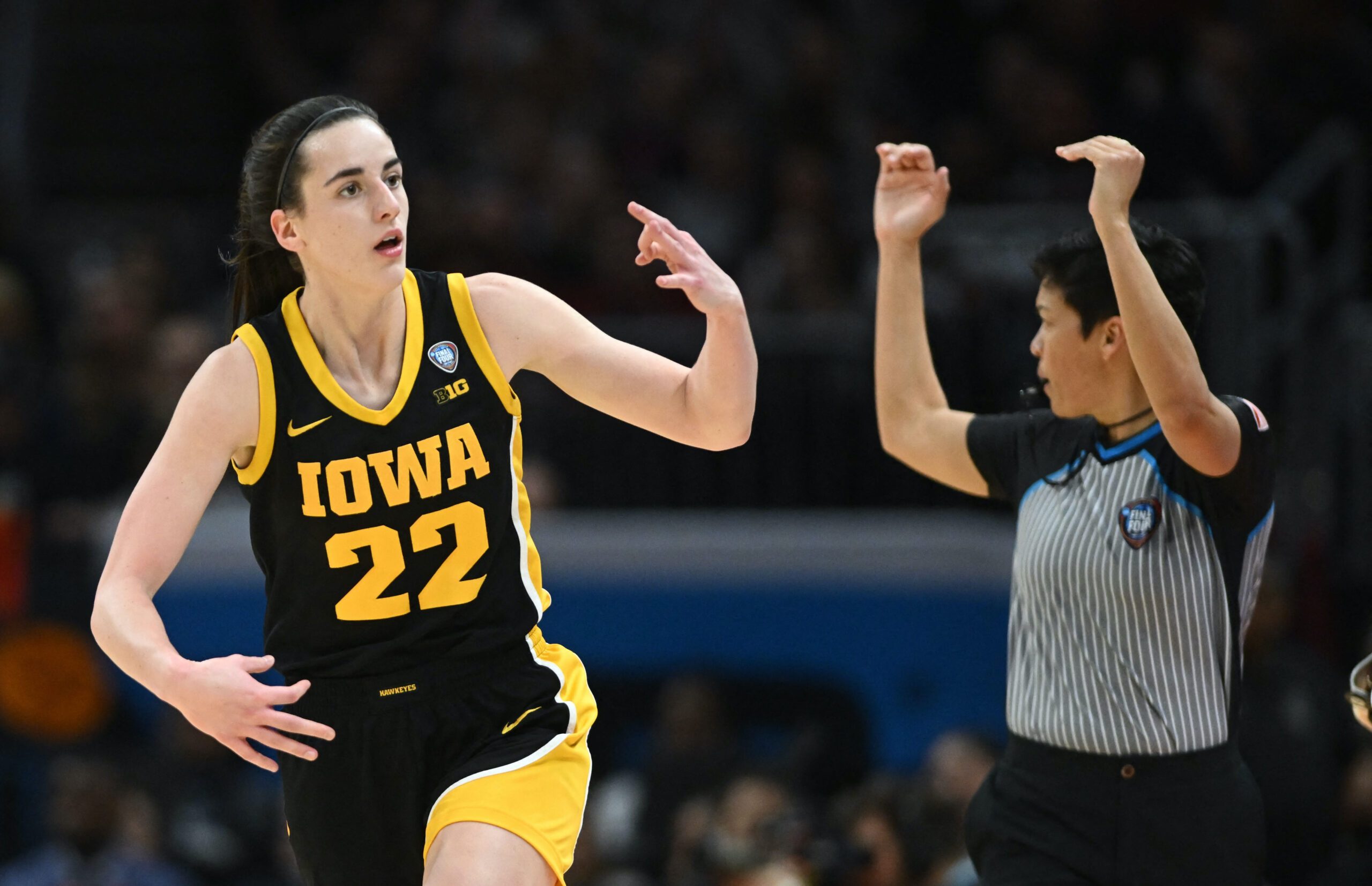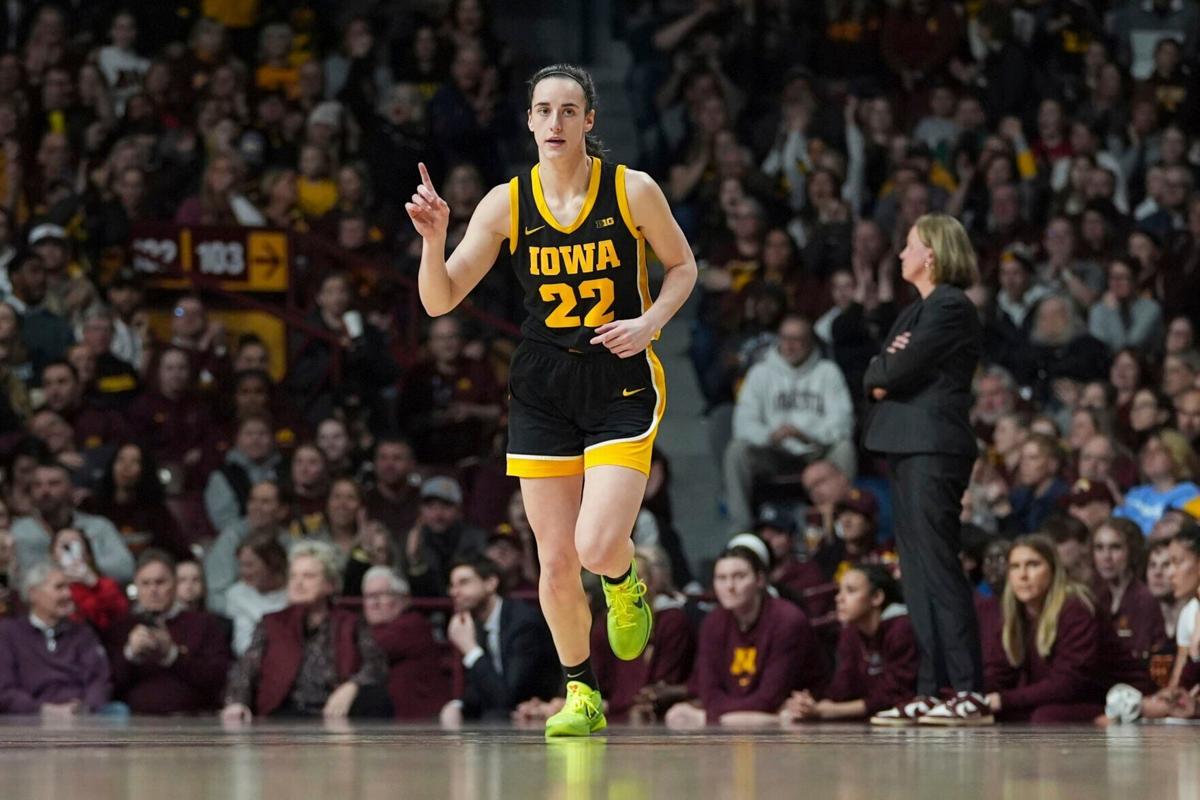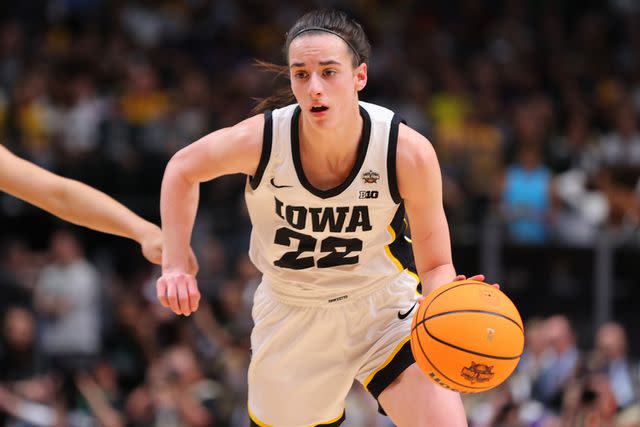The fallout from one analyst’s comments about Caitlin Clark continues to ripple, sparking widespread controversy, intense discussions on social media, and a broader debate about accountability and professional standards within sports journalism.
What began as a single comment from a high-profile sports analyst has quickly escalated into a national dialogue, underscoring the power and responsibility that come with a public platform.
Caitlin Clark, a star basketball player renowned for her remarkable talent and humble demeanor, became the unexpected center of controversy after comments from sports analyst Mark Thompson went viral.

Thompson, known for his often blunt and unfiltered style, made remarks during a live broadcast that many perceived as disrespectful and dismissive towards Clark’s skills and accomplishments.
During the broadcast, Thompson stated, “Caitlin Clark might be talented, but the hype surrounding her is exaggerated.
Let’s see her perform consistently at higher levels before we crown her as the best.”
The comment, though seemingly mild in isolation, ignited a firestorm on social media and drew strong reactions from fans, fellow athletes, and even professional colleagues.
The initial response was swift and overwhelmingly critical. Supporters of Clark pointed to her numerous achievements—setting scoring records, earning prestigious accolades, and consistently displaying sportsmanship—as evidence that Thompson’s comments were unfair and unfounded.
Fans rallied around Clark, flooding Twitter, Instagram, and Facebook with messages of support, encouragement, and fierce defense of her legacy.
Prominent athletes quickly joined the conversation, expressing their own reactions to Thompson’s remarks.
WNBA stars, NCAA coaches, and even NBA legends chimed in to defend Clark’s stellar reputation.
Sue Bird, a celebrated figure in women’s basketball, tweeted, “If you think Caitlin Clark hasn’t proved herself yet, you’re simply not watching the game.”
Similarly, LeBron James shared his perspective, emphasizing that young athletes like Clark should be celebrated, not undermined, as they elevate their respective sports.
As the backlash grew, Thompson himself became the target of significant scrutiny.
Many argued that his comments revealed underlying biases and a broader issue within sports journalism—namely, the tendency to prematurely judge or diminish the accomplishments of female athletes.
Critics noted that male athletes with similar or even lesser achievements often receive unequivocal praise, highlighting perceived double standards.
In response to the escalating criticism, Thompson issued a public apology through his personal Twitter account, saying, “My comments about Caitlin Clark were insensitive and poorly worded.
I acknowledge her incredible talent and achievements. My intention was never to diminish her accomplishments or contributions to the sport.”
However, his apology did little to stem the controversy. Many questioned the sincerity of his statement, suggesting that it came only after significant backlash rather than genuine reflection.
The debate expanded further, prompting discussions about the broader responsibilities of sports analysts and journalists.
Media ethicists and professional journalism organizations began to weigh in, emphasizing the importance of fair, respectful, and well-informed commentary.
The controversy also sparked a deeper analysis of how media representation affects female athletes.
Experts in sports psychology and gender studies contributed to the discussion, highlighting how biased commentary can affect athletes’ mental health and public perception.
Dr. Amanda Brooks, a sports psychologist, stated, “Comments like Thompson’s can have profound impacts.
They shape narratives and can negatively influence young athletes, affecting their confidence and the way the public views their achievements.”
Further complicating the issue, some defended Thompson’s right to express his opinion freely, arguing that sports commentary inherently involves subjective assessments.
They warned against creating an overly restrictive environment where analysts fear candid critiques.
Prominent journalist and commentator Stephen A. Smith voiced this perspective, noting, “We must be cautious not to silence genuine opinions.

Criticism and debate are integral to sports journalism. The key is balancing honesty with respect and accountability.”
Despite these arguments, the overwhelming consensus among industry professionals was clear: accountability in journalism matters profoundly.
ESPN, Thompson’s employer, quickly responded to the controversy by announcing an internal review of their editorial standards and training protocols.
In a statement, ESPN spokesperson Laura Mitchell said, “We recognize the impact words can have, especially when directed at athletes who are role models for millions.
We are reviewing our processes to ensure commentary aligns with our commitment to respect and fairness.”
The network’s swift action underscored the seriousness of the controversy. Media analysts pointed out that ESPN’s move highlighted a critical shift in sports journalism, where organizations now acknowledge their responsibility to foster respectful discourse. However, this shift also raised further questions about how sports media companies manage controversies internally and externally, prompting debates about transparency and editorial oversight.
As the controversy continued, Caitlin Clark herself maintained a notably low profile.
Choosing not to directly address Thompson’s comments publicly, Clark instead continued her impressive performance on the court, further solidifying her reputation through action rather than words.
During subsequent games, she delivered standout performances, effectively silencing critics through her undeniable skill and leadership.
Her coach and teammates, however, publicly expressed their unwavering support.
Coach Lisa Bluder, who has guided Clark throughout her collegiate career, emphasized the importance of protecting and supporting athletes from unfair criticism.
“Caitlin exemplifies everything that’s great about our sport,” Bluder said in a press conference.

“She’s a phenomenal athlete and an even better person. We should celebrate athletes like her, not subject them to unfounded criticism.”
Teammates echoed Bluder’s sentiments, praising Clark’s ability to remain composed amid intense public scrutiny.
“Caitlin is resilient,” teammate McKenna Warnock told reporters. “She’s shown us all how to handle adversity with class and dignity. The negativity only motivates her more.”
The broader sports community also took this moment as an opportunity for reflection and education.
Sports journalism courses, seminars, and professional workshops began incorporating discussions about ethical commentary, bias awareness, and responsible journalism into their curricula.
Universities hosting renowned journalism programs publicly addressed the controversy, emphasizing their commitment to training future journalists in ethical reporting standards.
Meanwhile, social media platforms continued to buzz with activity.
Hashtags like #SupportCaitlinClark and #AccountabilityInSports trended for weeks, facilitating broader conversations about respect, equality, and the evolving standards in sports commentary.
Influencers and sports personalities used these platforms to further promote positive messaging, turning a controversial moment into an opportunity for education and advocacy.
This incident has undeniably marked a significant turning point in sports journalism.
Analysts, journalists, and sports networks are increasingly aware that words carry weight and consequences, especially in today’s hyper-connected digital environment.
It has also highlighted the immense influence public figures have on shaping perceptions, underscoring their responsibility to communicate thoughtfully and respectfully.

Looking forward, industry experts predict that this controversy will serve as a lasting reminder of the need for sensitivity and accountability in sports media.
They suggest that future analysts and commentators will likely be more cautious, thoughtful, and responsible in their public statements.
As Dr. Michael Spencer, a professor of journalism ethics, stated, “This controversy should serve as a powerful lesson.
Journalists and commentators have an obligation to think deeply about their words and their potential impact.”
In the end, while the fallout from Mark Thompson’s comments continues to ripple, the incident has undoubtedly fostered critical discussions about professional standards, gender equality in sports, and the profound responsibilities associated with public commentary.
Caitlin Clark, through her dignified silence and exemplary athleticism, has indirectly facilitated a broader, necessary dialogue—one that has the potential to improve the landscape of sports journalism for years to come.



